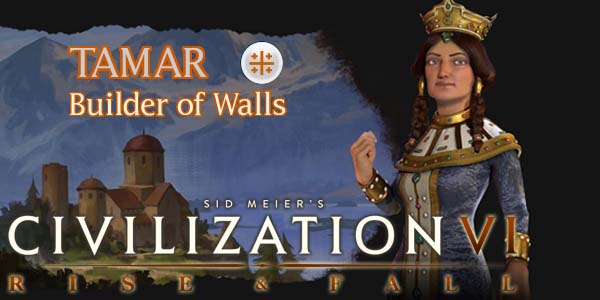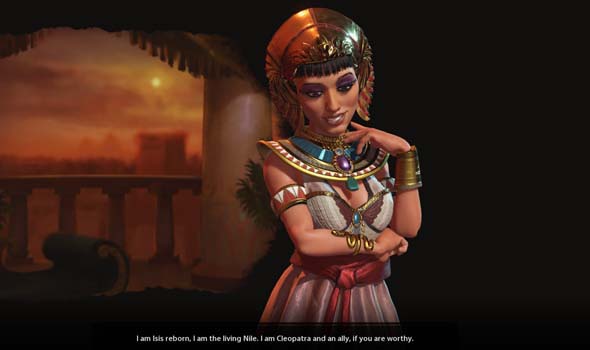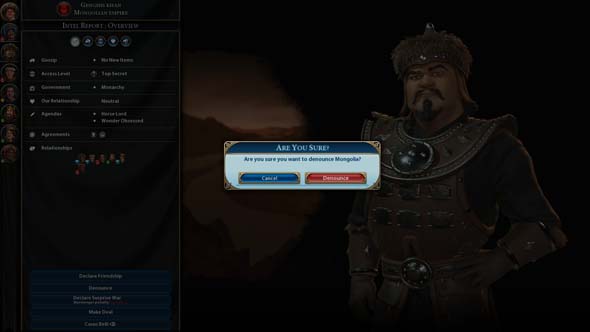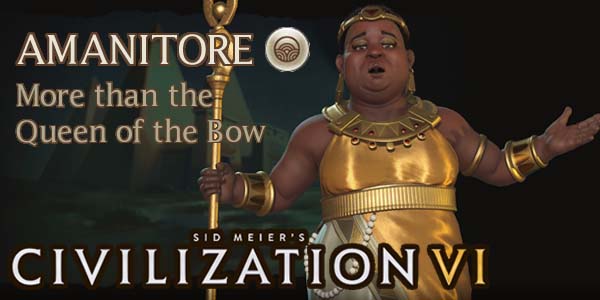
Civilization VI's first expansion, Rise & Fall released a couple months ago, and it introduced a few leaders and civilizations that are making their first appearance in the franchise. I hope to be able to write strategies for every one of the expansion civs and leaders, but I'm going to start with the ones that are new to the franchise, and the ones that most utilize the expansion's new features (Era Score, governors, loyalty, and so on). The first civilization that I will tackle will be the Georgian civilization, lead by Queen Tamar.
The feuding Georgian kingdoms in the Caucusus were first united under Bagrat III between 1008 and 1010 AD, after he tricked his cousins (the heads of feuding houses) into a false reconciliatory meeting, only to throw them into prison and ensure that his son would become heir to the kingdom. A few years later, however, that son would become a prisoner of the Byzantines as part of a peace deal after Bagrat's failed attempt to reclaim the ancestral city of Tao from the Eastern Roman Empire.

The Georgian empire reached its height under the rules of King David IV and Queen Tamar in the 12th and 13th centuries. These monarchs took advantage of the decline in Byzantine power and filled the power vacuum by claiming lands lost by the Byzantines. During this time, art and literature flourished, and Georgia developed its own architectural styles. Ecclesiastic art was dominant, but this period also saw some of the first major secular works of art and literature. This period would eventually become known as the Georgian Renaissance (or "Eastern Renaissance"). The renaissance continued under Tamar's rule, who proved adept at statecraft. She mediated internal tensions within her kingdom, and even thwarted a coup by her Russian husband, all the while protecting her kingdom from Turkish invasions and claiming Muslim lands to the east and south.
The Kingdom of Georgia's golden age would eventually come to an end at the hands of invading Mongols in the 13th century. The kingdom would be fractured, and the ensuing Black Death would ensure that Georgia would never again reach its former glory.
DISCLAIMER:
Civilization VI is still very early in its life-cycle (particularly the Rise & Fall expansion. Strategies for the game (and for specific leaders and civs) may change as Firaxis applies balance patches, introduces new features, or expands the game through further DLC or expansion packs, or as the Civ community discovers new strategies or exploits. As such, the following strategy guide may change from time to time. I will try to keep it up-to-date, and will make notations whenever changes are made. I'll also post links in the official 2K forums and CivFanatics, where I'll also report any changes made. If possible and practical, I will try to retain the original content of the strategy for posterity.
I welcome any feedback or suggestions that readers wish to offer. Feel free to post on the linked forums, or by posting a comment at the bottom of the page.
This guide is up to date as of the March 2018 patch (ver. 1.0.0.229)
In Civilization VI: Rise & Fall, Georgia is a defensive and religious civilization that thrives in its golden ages. Tamar is a bit of a religious world policewoman who builds strong relationships with city states that share her faith, and who will aggressively protect her city state allies. [More]
851c8f8a-f6ab-4afc-92d8-5eafc6a09aa4|0|.0
Tags:Sid Meier's Civilization, Civilization VI, Georgia, Tamar, strength in unity, glory of the world kingdom and faith, Narikala Fotress, Tsikhe, Khevsur, protectorate war, casus beli, city state, suzerain, envoy, religion, faith, golden age, era score, unique building, unique melee unit

Civilization VI's first expansion, Rise and Fall just launched this past weekend. The expansion does make some welcome enhancements to alliances that makes peaceful relations with other civs much more appealing. However, these enhancements do not address two of my most fundamental complaints with Civilization's diplomacy system in general: that it does not allow for truly cooperative victories, and that it does not really provide the player with any way to influence an A.I. civ's behavior. I've already written about ideas for cooperative victories for both Beyond Earth and for the core Civilization games, so I won't go into that again here. Instead, today's blog will focus on the second of my major hang-ups with diplomacy: that you simply cannot provide A.I. civs with any indication of what you consider friendly or hostile behavior.
Diplomacy has always been one of the major stumbling blocks of the Civilization games. Each game has certain mechanics or features that are good ideas on paper, but none of the games have ever really had a diplomacy system that really seems to work the way that it is intended, and which provides consistent behavior from the A.I.s. A.I.s are often erratic in their behavior -- both between games, and within a single game.

A single unit can be the difference between Cleopatra's abject disgust and her goo-goo-eyed adoration.
Civ VI introduces the agendas, which sound like a good idea on paper. It gives each leader an element of personality. They have things that they like, and things that they don't like. The problem is that these agendas lead to wild swings in an A.I.'s attitude, often based on rather trivial (and sometimes counter-intuitive) actions from the player. Often times the thresholds for activating these agendas are not entirely clear. Cleopatra tells me that my army is too weak and pathetic, and so she has a heavy negative modifier with me. Then I build a single Swordsman a couple turns later, and now suddenly my army is powerful enough to warrant her admiration, and she's looking me up and down with those goo goo eyes.
There's other legacy issues with diplomacy. The biggest one is the inability to ever warn another civ that their actions might lead to war. The denouncement mechanic of Civ V was a decent start, but since you could never provide a specific reason for your denouncements, they never seemed to have much weight in changing another civ's behavior. In a multiplayer game, you could always use the chat to inform other players' of your diplomatic desires, but there has never been any method for accomplishing this with A.I. civs in single-player.
Since the A.I. has no real clue why it is being denounced, there's no way for it to change its behavior. There's also no way for other A.I.s to understand if your denouncement or declaration of war is actually justified or not.

You can denounce a civ, but the A.I. won't really have any clue why they're being denounced.
Civilization VI tried to rectify this with the Casus Belli system, but that system also stumbles... [More]
892bf8a7-123e-470d-b094-32cec0a5eb7a|2|5.0
Tags:Sid Meier's Civilization, Civilization, Civilization V, Civilization VI, Civilization VI: Rise and Fall, leader, diplomacy, casus belli, friendship, agenda, denouncement, act of war, war, quest, city state, alliance, victory, AI

With the first expansion for Civilization VI due out soon, I wanted to try to get one more pre-expansion game strategy out of the gates. This time, I will be covering another of the DLC civs that is making its first appearance in the Civilization franchise: Nubia. If you purchased the Deluxe Edition of the game, then you received this DLC (among others) for free when the DLC was released. If you do not own the Deluxe Edition, then this DLC costs $5 USD.
Egypt wasn't the only grand ancient civilization that made a home along the Nile River. Starting around 5000 BC, into the 1500's AD, Egypt's southern neighbor was one of the many Kingdoms of Nubia that rose and fell. The Nubians who settled along the river were expert archers, and the contemporary Egyptians (who traded for Nubian gold, ebony, and pottery) referred to their land as "Ta-Seti", or "The Land of the Bow". But the history of civilization in the Nubian region goes back to the Neolithic revolution that occurred in Africa around 5000 BC. Archaeologists have found rock reliefs and even an astronomical stone circle that predates Stonehenge by roughly 2,000 years!

Kandake ["Queen"] Amanitore co-ruled Nubia from her capital at the Gebel Barkal in Meroë starting around 1 BC. The Nubian civilization had a maternal rule, with the mothers of kings having authority over their sons, and sometimes even deposing them or ordering them to commit suicide if the mother believed them to be unfit as rulers. Amanitore's kingdom was wealthy and prosperous at this time, and Amanitore oversaw the construction and repair of multiple Temples to Amun throughout her kingdom, as well as the construction of Nubian Pyramids. She is regarded as one of the greatest builders in her people's history, and is believed to be buried underneath one of her Pyramids in Meroë.
DISCLAIMER:
Civilization VI is still very early in its life-cycle. Strategies for the game (and for specific leaders and civs) may change as Firaxis applies balance patches, introduces new features, or expands the game through DLC or expansion packs, or as the Civ community discovers new strategies. As such, the following strategy guide may change from time to time. I will try to keep it up-to-date, and will make notations whenever changes are made. I'll also post links in the official 2K forums and CivFanatics, where I'll also report any changes made. If possible and practical, I will try to retain the original content of the strategy for posterity.
I welcome any feedback or suggestions that readers wish to offer. Feel free to post on the linked forums, or by posting a comment at the bottom of the page.
This guide is up to date as of the Fall 2017 patch (ver. 1.0.0.194) (Southeast Asia DLC)
In Civilization VI, Nubia is a militaristic and religious civilization that specializes in rapidly developing city districts, especially in desert terrain... [More]
77d297db-8400-4835-a27b-1176e274e25d|2|5.0
Tags:Sid Meier's Civilization, Civilization VI, Nubia, Amanitore, Ta-Seti, Kandace of Meroe, city planner, pitati archer, archer, pyramid, Nubian Pyramid, mine, gold, luxury, strategic resource, war, district, production, adjacency bonus, Gebel Barkal, Meroe, Egypt, Neolithic revolution, stone circle, unique improvement, unique ranged unit

I've already written guides for some of Civilization VI's vanilla newcomer civs and leaders, so now I'm going to move onto one of the DLC civilizations that makes its first appearances in the franchise: John Curtin's Australia. This civ and leader are part of the "Deluxe Edition DLC". If you purchased the Deluxe Edition of the game, then you received this DLC (among others) for free when it was released. If you do not own the Deluxe Edition, then this DLC costs $5 USD.
Australia is currently the sixth largest country in the world (by land area) and is the only contemporary country that occupies an entire mainland continent. The continent was inhabited by the hunter-gatherer aboriginal Australians as long as 70,000 years ago, but very little is known about their history and culture. It is believed that they arrived on the continent via land bridges in Southeast Asia (probably connecting Indonesia and New Zealand to mainland Asia). The Dutch were the first Europeans to reach Australia in 1606, but it was the English that began colonizing the island-continent in 1788 to act as a penal colony in response to the recent American independence, which lead to a rapid decline in the native population. By the mid 1800's, Australia had ended the prisoner transport, and the colony began its transition into a full-blown nation.

John Curtin was the prime minister of Australia throughout most of World War II. He was appointed after the previous prime minister, Robert Menzies, was deposed by his own party. Curtin aligned Australia closely with the United States, which upset many British traditionalists, but proved instrumental in preventing the Japanese capture of the Philipines from turning into an invasion of mainland Australia. Curtin's leadership during the war, and his popular social service programs allowed him to coast to a mid-war re-election victory in 1943, but he did not complete that term due to rapidly-deteriorating health that lead to his death in 1944. He remains one of Australia's most beloved prime ministers.
DISCLAIMER:
Civilization VI is still very early in its life-cycle. Strategies for the game (and for specific leaders and civs) may change as Firaxis applies balance patches, introduces new features, or expands the game through DLC or expansion packs, or as the Civ community discovers new strategies. As such, the following strategy guide may change from time to time. I will try to keep it up-to-date, and will make notations whenever changes are made. I'll also post links in the official 2K forums and CivFanatics, where I'll also report any changes made. If possible and practical, I will try to retain the original content of the strategy for posterity.
I welcome any feedback or suggestions that readers wish to offer. Feel free to post on the linked forums, or by posting a comment at the bottom of the page.
This guide is up to date as of the Fall 2017 patch (ver. 1.0.0.194) (Southeast Asia DLC)
In Civilization VI, Australia is a civilization that favors expansion along coasts and wherever they have access to pasture animal resources. John Curtin is a defensive leader who can act as a sort of "sleeping giant" "world police", who can churn out a large military quickly if he is ever the target of a war or if he liberates another player (or city state) city. [More]
1df3bd1f-ebb3-4cbd-afbf-17cea4fbac4f|1|5.0
Tags:Sid Meier's Civilization, Civilization VI, Australia, John Curtin, land down under, citadel of civilization, perpetually on guard, digger, outback station, pasture, coast, appeal, culture bomb, war, liberate, defensive pact, city state, sleeping giant, unique improvement, unique melee unit

Earlier today, I served as a guest host for the Civilization podcast Polycast, episode 295. I joined regular hosts DanQ, Makahlua, MadDjinn, and TheMeInTeam. The episode covered a handful of topics, ranging from the new religion mechanics introduced by the fall 2017 patch, to a proposal for athletes to be a type of great person, the new Civilization: A New Dawn board game, to the issue of micro-transactions (or "Recurrent Consumer Spending" as Take-Two Interactive CEO, Strauss Zelnick calls it), and more.
If you missed the live broadcast, then the edited archive version will be released on PolyCast's website next Saturday (December 2). I'll update this post with a link once the archive is updated.
"Recurrent Consumer Spending"
"Recurrent Consumer Spending" was one of the primary topics of the previous episode (PolyCast #294), and so we discussed it again as part of a discussion on feedback from last week's episode. Micro-transactions (and loot boxes in particular) are a hot topic in gaming of late, especially after the fiasco that was EA's launch of Star Wars: Battlefront II. Games pundit Jim Sterling has made micro-transactions an almost weekly issue in his Youtube podcast The Jimquisition. Sterling has been comparing loot boxes to gambling for months, and recently, some European regulatory agencies have started to evaluate whether loot boxes should legally be classified as a type of gambling. As someone who has previously worked for a gambling company, I am aware of how compulsive impulses are used to keep gamblers addicted to a particular game, and I definitely believe that the current implementation of loot boxes in games like Shadow of War, Call of Duty, and Star Wars: Battlefront does try to capitalize on those same addictive impulses, and so should probably be regulated similarly to gambling. I don't want micro-transactions in my games at all, but I don't necessarily think that such things should be illegal per se. But they should be regulated, and I do think that the game boxes should clearly indicate to parents that the game includes "gambling-like elements" (or some other warning).
Jim Sterling has been making a fuss about micro-transactions and loot boxes for months.
WARNING: May not be appropriate for younger or more sensitive viewers.
More importantly (for me), however, is the concerns for what micro-transactions do to the actual game. Just last night, I spent something like 4 hours in Shadow of War grinding my character and orc captains up to a point that I could siege the castle in Act II. I played every side mission available in the chapter, and then still had to do some Nemesis missions, in order to get Talion up to level 20 and unlock the ability to assign a third uruk captain to my siege assault. That third captain was essential to get my siege level up above the level of the defenders. I'm not sure if that was necessary, but I didn't want to risk having my captains killed during the attack. I actually happen to really like Brûz The Chopper, so I didn't want him dying because my siege was under-leveled. This is just Act II! I can't imagine how grindy the game might become during the later acts! And all this extra grind in the campaign is a direct result of the inclusion of the game's War Chest (i.e. loot boxes). You can spend real-life money to buy random orc captains to use in your sieges or to defend your captured forts. So the whole game is balanced such that it's just enough of a grind to encourage people to spend money to speed things along by buying the War Chest.
Well, Take-Two CEO Strauss Zelnick has said that he wants every game in 2K's library to include "recurrent consumer spending". That would include my beloved Civilization... [More]
8f53a504-5bbb-4626-ba4a-56406fa073a4|0|.0
Tags:PolyCast, Civilization, Sid Meier's Civilization, Civilization III, Civilization IV, Civilization: Colonization, Civilization V, Civilization VI, Firaxis, podcast, DanQ, Makahlua, TheMeInTeam, MadDjinn, micro-transaction, gambling, Strauss Zelnick, Take-Two Interactive, 2K Games, Jim Sterling, Jimquisition, Middle-Earth: Shadow of War, Brûz The Chopper, board game, Sid Meier's Civilization the Board Game, Sid Meier's Civilization: A New Dawn
|

| 12 | | | | | | | 60 | | 11 | | | | | | | 55 | | 10 | | | | | | | 50 | | 09 | | | | | | | 45 | | 08 | | | | | | | 40 | | 07 | | | | | | | 35 | | 06 | | | | | | | 30 | | 05 | | | | | | | 25 | | 04 | | | | | | | 20 | | 03 | | | | | | | 15 | | 02 | | | | | | | 10 | | 01 | | | | | | | 05 |
|